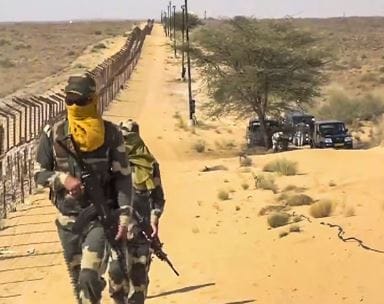Heatstroke Claims Lives of BSF Personnel on India-Pakistan Border
In a tragic incident on July 19, 2024, an Assistant Commandant and a Head Constable of the Border Security Force (BSF) lost their lives due to heatstroke and dehydration while on a ‘zero line’ patrol in the ‘Harami Nallah’ creek area along the India-Pakistan international front in Gujarat.
A Grim Reminder of Border Patrol Risks
This unfortunate event serves as a stark reminder of the extreme conditions faced by BSF personnel guarding India’s borders. The ‘Harami Nallah’ region is known for its harsh terrain and scorching temperatures, especially during the summer months. The incident raises concerns about the adequacy of safety measures, including acclimatization protocols, hydration strategies, and emergency response mechanisms, for personnel deployed in such challenging environments.
A Call for Improved Safety Measures
While the BSF has taken steps to address heat-related risks, such as providing heatstroke prevention training and issuing guidelines on hydration and rest, this incident highlights the need for continuous improvement and adaptation to the evolving challenges posed by climate change.
The BSF’s commitment to the security of India’s borders is commendable, but it is imperative that the well-being of its personnel remains a top priority. This tragedy underscores the need for a comprehensive review of existing safety protocols and the implementation of additional measures to mitigate the risks associated with extreme heat exposure.
Summary
The tragic deaths of a BSF officer and jawan due to heatstroke during a border patrol in Gujarat underscore the dangers faced by personnel operating in extreme environments. This incident calls for a thorough evaluation of existing safety measures and the implementation of additional safeguards to protect those who dedicate their lives to safeguarding India’s borders.
Key Learning Points
| Key Point | Analysis |
|---|---|
| Heatstroke is a serious threat to personnel working in extreme conditions. | The incident emphasizes the need for comprehensive heatstroke prevention measures, including acclimatization, hydration, and rest protocols. |
| Existing safety measures may need to be reevaluated and strengthened. | The BSF’s existing protocols should be reviewed to identify potential gaps and areas for improvement. |
| Climate change poses an increasing risk to those working outdoors. | The BSF must adapt its safety measures to address the escalating challenges posed by rising temperatures and extreme weather events. |
| The well-being of personnel should be a top priority. | Ensuring the safety and health of BSF personnel is crucial for maintaining operational effectiveness and upholding the organization’s commitment to protecting India’s borders. |
| The incident highlights the sacrifices made by those who serve their country. | The tragic loss of two BSF personnel serves as a somber reminder of the sacrifices made by those who dedicate their lives to protecting the nation’s borders. |
| Public awareness of the risks faced by BSF personnel is important. | Raising awareness about the challenges faced by BSF personnel can foster greater appreciation for their service and encourage support for improved safety measures. |
| This incident should serve as a catalyst for change. | The BSF and relevant authorities should view this tragedy as an opportunity to implement meaningful changes that will better protect personnel and prevent similar incidents in the future. |
Soumya Smruti Sahoo is a seasoned journalist with extensive experience in both international and Indian news writing. With a sharp analytical mind and a dedication to uncovering the truth, Soumya has built a reputation for delivering in-depth, well-researched articles that provide readers with a clear understanding of complex global and domestic issues. Her work reflects a deep commitment to journalistic integrity, making her a trusted source for accurate and insightful news coverage.



